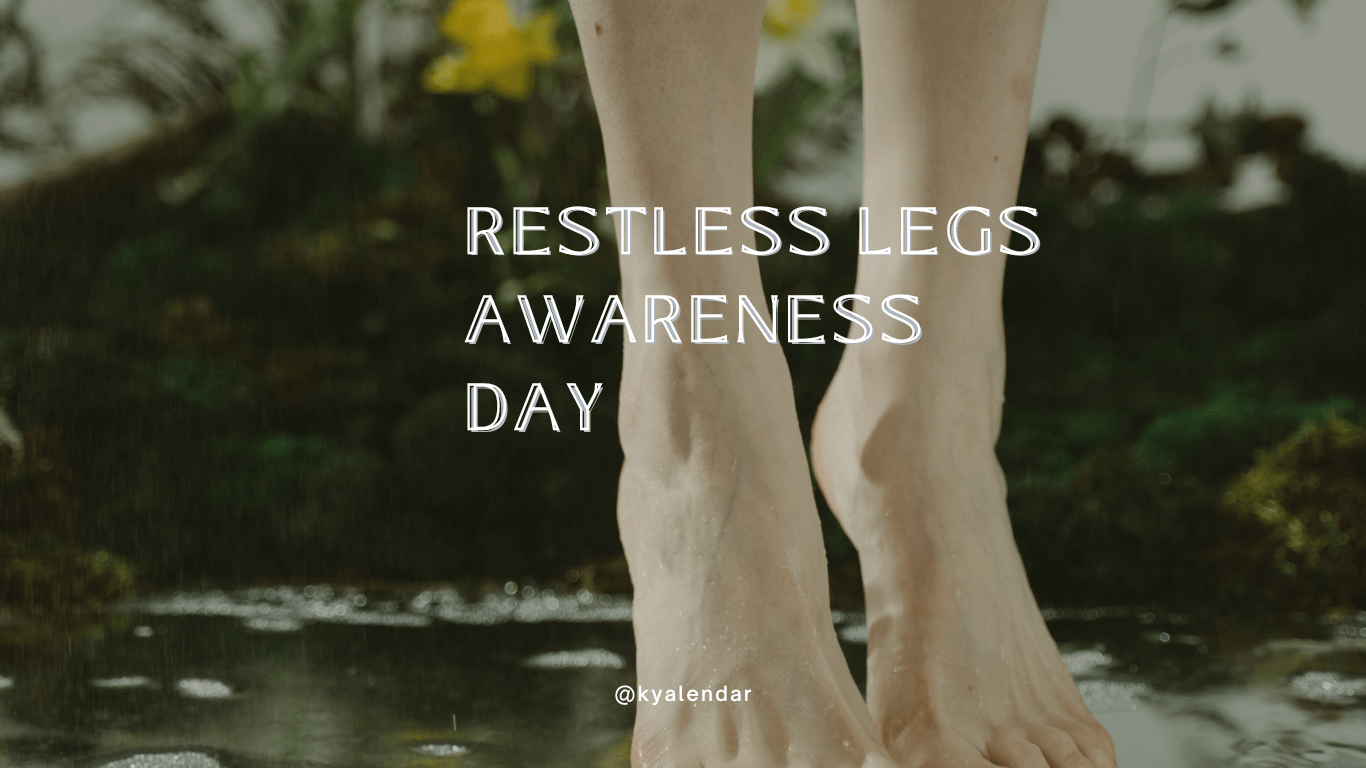
- This event has passed.
Restless Legs Awareness Day
September 23

Restless Legs Awareness Day, observed on September 23rd each year, is dedicated to raising awareness about restless legs syndrome (RLS), a neurological condition that affects millions of people worldwide. The day aims to increase understanding of RLS, promote better management strategies, and support those living with the condition.
Understanding Restless Legs Syndrome
Restless Legs Syndrome, also known as Willis-Ekbom Disease, is a condition characterised by an uncontrollable urge to move the legs. This urge is often accompanied by uncomfortable sensations, such as tingling, itching, or crawling feelings, primarily when at rest or during periods of inactivity. These symptoms typically worsen in the evening and at night, which can lead to significant disruptions in sleep and overall quality of life.
RLS is a disorder of the nervous system, and its exact cause is not fully understood. However, it is believed to be related to imbalances in the brain’s dopamine pathways, which are involved in controlling movement. Genetic factors also play a role, as RLS often runs in families. Additionally, certain health conditions, such as iron deficiency, kidney failure, and pregnancy, can exacerbate or trigger symptoms.
The Impact of Restless Legs Syndrome
Living with RLS can have a profound impact on daily life. The constant urge to move the legs and the associated discomfort can make it difficult to relax or stay still, leading to poor sleep quality and chronic fatigue. This, in turn, can affect mood, concentration, and overall well-being.
For many people with RLS, the condition can lead to significant challenges in maintaining a normal routine, particularly during evening and nighttime activities. The inability to get restful sleep can affect work performance, social interactions, and overall quality of life.
Objectives of Restless Legs Awareness Day
- Increasing Awareness: Restless Legs Awareness Day seeks to educate the public about RLS, its symptoms, and its impact on individuals’ lives. By raising awareness, the day aims to foster a better understanding of the condition and encourage those who may be experiencing symptoms to seek medical advice.
- Promoting Diagnosis and Treatment: The day highlights the importance of early diagnosis and effective treatment for RLS. Many people with RLS may not realise that their symptoms are related to a specific condition, which can delay diagnosis and treatment. Raising awareness helps encourage individuals to consult healthcare professionals and explore appropriate management strategies.
- Supporting Research: Restless Legs Awareness Day supports efforts to advance research into the causes, treatments, and potential cures for RLS. Increased awareness can lead to greater funding and support for research initiatives, which are essential for improving treatment options and understanding the condition better.
- Providing Resources: The day aims to connect individuals with resources and support networks that can help them manage their condition. This includes information about symptom management, treatment options, and support groups for those living with RLS.
Ways to Observe Restless Legs Awareness Day
- Educate Yourself and Others: Take time to learn about restless legs syndrome and its impact. Share this knowledge with friends, family, and colleagues to help increase awareness and understanding of the condition.
- Support RLS Organisations: Many organisations and charities focus on RLS awareness and support. Consider contributing to these organisations, whether through donations, volunteering, or participating in their events.
- Participate in Awareness Events: Join local or online events dedicated to Restless Legs Awareness Day. These events may include educational seminars, support group meetings, or fundraising activities aimed at raising awareness and supporting research.
- Advocate for Better Care: Use this day to advocate for improved healthcare services and support for individuals with RLS. This can involve speaking with healthcare providers, participating in advocacy campaigns, or raising awareness about the need for better treatment options.
- Share Personal Stories: If you or someone you know lives with RLS, consider sharing personal experiences and stories to highlight the challenges and successes of managing the condition. Personal narratives can be powerful tools for fostering empathy and understanding.
- Promote Research: Support and promote research initiatives focused on restless legs syndrome. This could involve participating in clinical trials, supporting research funding, or spreading the word about ongoing studies.
Managing Restless Legs Syndrome
Effective management of RLS often involves a combination of lifestyle changes, medical treatments, and self-care strategies. Some common approaches include:
- Medications: Doctors may prescribe medications that help regulate dopamine levels or address underlying issues such as iron deficiency.
- Lifestyle Changes: Regular physical activity, maintaining a consistent sleep schedule, and avoiding caffeine and alcohol can help alleviate symptoms.
- Self-Care Techniques: Techniques such as stretching exercises, hot or cold baths, and massage can provide temporary relief from RLS symptoms.
Conclusion
Restless Legs Awareness Day is an important occasion to raise awareness about restless legs syndrome and its impact on individuals’ lives. By educating ourselves and others, supporting research, and advocating for better care, we can contribute to a greater understanding of RLS and help improve the quality of life for those affected by this challenging condition. Celebrating this day not only honours those living with RLS but also promotes progress towards better management and support for the condition.
Details
- Date:
- September 23